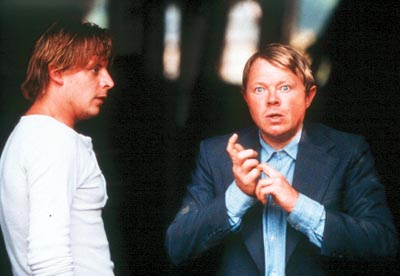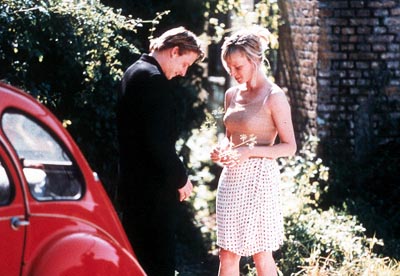Mifune


That's Mifune as in Toshiro Mifune, the late Japanese acting legend and frequent collaborator of the late Akira Kurosawa. And how does this all fit into a Danish movie? In the end, it is clear, but still does not really make any sense. Which can be said for the rest of the movie. Maybe it's a Danish thing. As a result, when watching Mifune, the viewer isn't sure whether to laugh or to cringe, or both. This is the third Dogma 95 film, after The Celebration, The Idiots, and the forthcoming The King is Alive (Harmony Korine's julien donkey-boy falls in there somewhere also). The Dogma films are interesting in that they represent a 'back to basics' approach to filmmaking. The self-titled manifesto was set up by four Danish directors (including Mifune writer/director Soren Kragh-Jacobsen, The Boys from St. Petri, The Island on Bird, Street and Lars Von Trier). Dogma rules include a ban on anything artificial, including lighting, and music. Everything in the scene must appear as it does, there are no props allowed. The movie must take place in the present, and must not be a genre movie. Hand-held cameras are the only cameras allowed for filming. The director may not take credit for the film, and must sign a vow of chastity.
In Mifune, Kresten (Anders W. Berthelsen, Portland) returns to the country to tend to his retarded brother Rud (Jesper Asholt, Let's Get Lost, Baby Doom) and his father's funeral. He is newly married, and has not had any contact with his family for over ten years. He does not want to return to his family farm, which he associates with poverty and backward rural life. He wants to stay at home long enough to find a place where Rud can stay. Kresten hires Liva (Iben Hjejle, High Fidelity, Skagerak) as a housekeeper, to look after things in the (hopefully) short time he is there. In reality, Liva is a hooker. She moved to the farm to escape a stalker who continually calls her with sexually explicit crank calls. Kresten's wife come to visit, sees Liva, and storms off before Kresten can explain. Liva's younger brother Bjarke (Emil Tarding) flunks out of school and comes to stay with Liva. Together, they form a strange, dysfunctional family unit.
Mifune refers to a game Kresten and Rud played when they were children. Kresten pretended to fight Toshiro Mifune's character from Kurosawa's The Seven Samurai. The entire set up sounds like a comedy, and it may well be, no one really can tell. Rud believes Liva is a character from a comic book, and believes aliens exist and will be coming back soon. However, there is also a budding relationship between Liva and Kresten, both of which are afraid to reveal too much to the other. Events become stranger as the movie nears its conclusion, and the end itself is somewhat baffling. What happened? Ultimately, no one cares. The Dogma rules give Mifune a crisp, natural look. The purpose of the rules is to let the characters and the stories take prominence over anything else. It works, but when the story and characters are as strange as they are in Mifune, they just appear stranger. Watch Mifune for the technical aspects of the film, not for the story.